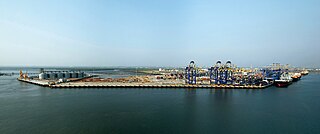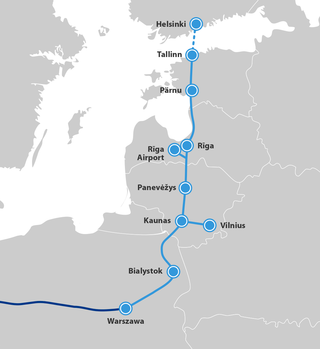Related Research Articles

Transport in Pakistan is extensive and varied. In recent years, new national highways have been built, with the addition of motorways which have improved trade and logistics within the country. Pakistan's rail network is also undergoing expansion in recent years. Airports and seaports have been built with the addition of foreign and domestic funding. Transportation challenges in Pakistan are escalating due to poor planning, inadequate governance, and corrupt practices.

Pakistan Railways is the national, state-owned railway company of Pakistan with its headquarters in Lahore. Founded in 1861 as the North Western State Railway and headquartered in Lahore, it owns 7,789 kilometres of operational track across Pakistan, stretching from Peshawar to Karachi, offering both freight and passenger services, covering 488 operational stations across Pakistan.

Rail freight transport is the use of railways and trains to transport cargo as opposed to human passengers.

The Port Muhammad Bin Qasim, or Qasim Port Authority, also known as Port Qasim, is a deep-water seaport in Karachi, Sindh, Pakistan, on the coastline of the Arabian Sea under the administrative control of the Secretary to the Government of Pakistan for Maritime Affairs. It is Pakistan's second busiest port, handling about 35% of the nation's cargo. Port Qasim and Karachi Port, the busiest port of the country, together handle almost 90% of all external trade of Pakistan. The remaining maritime trade is routed through Gwadar Port.

The Islamic Republic of Iran Railways is the national state-owned railway system of Iran. The Raja Passenger Train Company is an associate of the IR, and manages its passenger trains. The Railway Transportation Company is an associate of the IR, which manages its freight transport. The Ministry of Roads & Urban Development is the state agency that oversees the IRIR. Some 33 million tonnes of goods and 29 million passengers are transported annually by the rail transportation network, accounting for 9 percent and 11 percent of all transportation in Iran, respectively (2011).
Aurizon Holdings Limited is a freight rail transport company in Australia, formerly named QR National Limited and branded QR National. In 2015, it was the world's largest rail transporter of coal from mine to port. Formerly a Queensland Government-owned company, it was privatised and floated on the Australian Securities Exchange (ASX) in November 2010. The company was originally established in 2004–05 when the coal, bulk, and container transport divisions from Queensland Rail were brought under one banner as QR National.
This is a list of planned, or proposed, high-speed rail projects by country. Although a number of countries have conducted preliminary feasibility studies, many lines are eventually shelved or postponed due to high costs; only a few nations are building high-speed rail lines. Planned lines are separated here from lines under construction, and some countries have both. High-speed rail is public transport by rail at speeds over 200 km/h (125 mph).
Eswatini Railways (ESR), formerly known as Swaziland Railway or Swazi Rail, is the national railway corporation of Eswatini.

The Avondale–Southdown Line is a proposed railway line between Avondale and Southdown in Auckland, New Zealand. One of its main functions would be to remove north–south freight trains from parts of the Auckland rail system that have significant passenger traffic.

Afghanistan has three railway lines in the north of the country. The first is between Mazar-i-Sharif and the border town of Hairatan in Balkh province, which then connects with Uzbek Railways of Uzbekistan. The second links Torghundi in Herat province with Turkmen Railways of Turkmenistan. The third is between Turkmenistan and Aqina in Faryab province of Afghanistan, which extends south to the city of Andkhoy. The country currently lacks a passenger rail service, but a new rail link from Herat to Khaf in Iran for both cargo and passengers was recently completed. Passenger service is also proposed in Hairatan – Mazar-i-Sharif section and Mazar-i-Sharif – Aqina section.

Rail Baltica is an under-construction rail infrastructure project that is intended to integrate the Baltic states in the European rail network. Its purpose is to provide passenger and freight service between participating countries and improve rail connections between Central and Northern Europe, specifically the area southeast of the Baltic Sea. It is also intended as a catalyst for building the economic corridor in Northeastern Europe. The project envisages a continuous rail link from Tallinn (Estonia) to Warsaw (Poland), consisting of links via Riga (Latvia), Kaunas, and Vilnius (Lithuania). Its total length in the Baltic States is 870 kilometres (540 mi), with 213 kilometres (132 mi) in Estonia, 265 kilometres (165 mi) in Latvia, and 392 kilometres (244 mi) in Lithuania. Rail Baltica is one of the priority projects of the European Union (EU). It is part of the North Sea–Baltic Corridor of the Trans-European Transport Networks (TEN-T).
The Surat Basin Railway is a proposed 210-kilometre (130 mi) freight railway in Queensland, Australia. It is planned to connect the Western railway line near Wandoan which is 230 kilometres (140 mi) north west of Toowoomba with the Moura railway line, near Banana, 130 kilometres (81 mi) west of Gladstone.

Etihad Rail is the United Arab Emirates national railway network. It was established in June 2009 under Federal Law No. 2 to manage the development, construction and operation of the United Arab Emirates' national freight and passenger railway network. Etihad Rail aims to link the UAE's principal centres of industry and population, and to link these centres with other railways throughout the Gulf Cooperation Council.

The Tatanagar–Bilaspur section is part of the Howrah–Nagpur–Mumbai line and connects Tatanagar in the Indian state of Jharkhand and Bilaspur in Chhattisgarh. Part of one of the major trunk lines in the country, it passes through an industrial-mining area and handles high volumes of freight, particularly coal and iron ore.

China–Pakistan Economic Corridor is a 3,000 km Chinese infrastructure network project currently under construction in Pakistan. This sea-and-land-based corridor aims to secure and shorten the route for China’s energy imports from the Middle East, avoiding the existing path through the Straits of Malacca between Malaysia and Indonesia, which could be blockaded in case of war, thereby threatening China’s energy-dependent economy. Developing a deep-water port at Gwadar in the Arabian Sea and establishing a robust road and rail network from this port to the Xinjiang region in western China would serve as a shortcut, enhancing trade between Europe and China. In Pakistan, the project aims to address electricity shortages, develop infrastructure, and modernize transportation networks, while also transitioning the economy from an agriculture-based structure to an industrial one.

Xi Jinping's visit to Pakistan from 20 to 21 April 2015, was the first state visit of Xi Jinping to Pakistan. Xi is the second Chinese leader to visit Pakistan in the 2010s after Chinese Premier Li Keqiang's visit to Pakistan between 22 and 23 May 2013. It was also Xi's first overseas trip of 2015. The trip led to the signing of accords for $46 billion of investment in Pakistan by China for the construction of roads, rails, and power plants to be built on a commercial basis by Chinese companies over 15 years. Most of the 51 projects were part of the China–Pakistan Economic Corridor.

The 1,320 megawatt Pakistan Port Qasim Power Project comprises two 660 megawatt supercritical coal power plants, one of which was inaugurated in December 2016 as part of the China–Pakistan Economic Corridor. The $2.09 billion project is located on 330.7 acres at Port Qasim, 37 kilometers east of Karachi in Sindh Province. The project is part of a group of 14 energy projects which fall under the fast-tracked "Early Harvest" program of the $46 billion China Pakistan Economic Corridor project.
The Sahiwal Coal Power Project is a coal power plant project located in the province of Punjab in Pakistan by the name of Huaneng Shandong Ruyi (Pakistan) Energy (Limited). It has an installed capacity of 1320 MW. It commenced full operations on 3 July 2017.

Syamal Bhushan Ghosh Dastidar is an ex-Indian Civil Servant, former Member Traffic of the Railway Board and Ex-Officio Secretary to the Government of India. In 2009, he was awarded the Padma Shri, India's fourth highest civilian award in the civil service category. He was the only one who is felicitated with this honor in 2009 in the Civil Service category.
The Karachi Freight Corridor is a significant infrastructure project in Pakistan aimed at improving the movement of freight from the Karachi port city to various parts of the country. The project involves the construction of a dedicated double-track corridor and other related facilities.
References
- ↑ "Long-awaited rail track to ferry Thar coal okayed". The Express Tribune. September 3, 2023.
- 1 2 3 4 5 "Energy Update - News, Updates related to Power, Nuclear, Solar, Renewable Energy in Pakistan". January 1, 2023.
- ↑ "Senate Body Recommends Allocating Rs. 40 Billion for Construction of Railway Link to Carry Thar Coal".
- ↑ Kamran, Asad Ullah (December 31, 2022). "How feasible is the Thar coal railway?". Profit by Pakistan Today.
- ↑ "Railway Link to Thar Coal Mines Approved". www.constructionworld.in.
- ↑ "MoU signed to construct 105KM rail track in Thar Coal". December 21, 2021.
- ↑ "Thar mine's linking with rail network to help boost coal supply chain". The Nation. December 24, 2022.
- ↑ "Govt to Provide Railway Access to Thar Coal Mines and Port Qasim".